IP
-
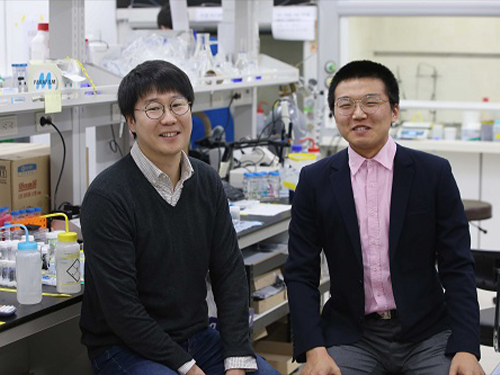 Undergrad's Paper Chosen as the Cover Article in Soft Matter
(from left: Research Professor KyuHan Kim and Undergrad Student Subeen Kim)
A KAIST undergraduate student, Subeen Kim, had his paper chosen as the cover article in an international journal during his senior year.
There have been an increasing number of undergraduate students who were published as the first author because the KAIST Undergraduate Research Participation program allows more active research participation by undergraduate students.
Through URP, Kim successfully published his paper in the internationally-renowned journal, Soft Matter, which is published by the Royal Society of Chemistry, and it was chosen as the cover article of that journal in February 2018.
This publication means a lot to him because he designed the cover image himself, based on his imagination and observations.
His research is about controllable one-step double emulsion formation. Double emulsion is a system in which dispersed droplets contain additional immiscible liquid droplets.
Having great retention ability, double emulsion has been used in various applications in the food industry, in cosmetics, and for drug delivery. Nevertheless, two-step emulsification is a conventional approach to produce double emulsions that typically leads to partial destabilization of the emulsion formed during the initial stage. Hence, it does not ensure the stability of a double emulsion. On the other hand, a microfluidic approach with various flow-focusing techniques has been developed, but it has low production efficiency and thus limited industrial applications.
Kim’s results came from the process of phase inversion to solve this problem. He identified the instant formation of double emulsions during the process of phase inversion. Based on this finding, he proposed criteria to achieve high stability of double emulsion.
Through constant research, he developed a quite general method using a combination of an oil soluble poly methyl methacrylate (PMMA) and hydrophobic silica nanoparticle (HDK H18). This new method enables one-step and stable production of double emersions in a stable manner. It also allows control of the number and the volume of inner oil droplets inside the outer water droplets by adjusting PMMA and HDK H18.
Kim enrolled at KAIST as a KAIST Presidential Fellowship and Presidential Science Scholarship in 2014. While studying both chemical and biomolecular engineering and chemistry he has been developing his hypothesis and conducting research.
He was able to begin conducting research because he has taken part in URP projects twice. In his sophomore year, he studied the formation of high internal phase double emulsions. After one year, he conducted research to produce superabsorbent resins, which are the base material for diapers, by using colloid particles. Using partial research outcomes, he published his paper in Nature Communications as a second author.
Kim said, “Double majoring the chemical and biomolecular engineering and chemistry has helped me producing this outcome. I hope that this research contributes to commercializing double emulsions. I will continue to identify accurate principles to produce chemicals that can be controlled exquisitely.”
Figure 1. The cover article of Soft Matter
2018.05.03 View 13396
Undergrad's Paper Chosen as the Cover Article in Soft Matter
(from left: Research Professor KyuHan Kim and Undergrad Student Subeen Kim)
A KAIST undergraduate student, Subeen Kim, had his paper chosen as the cover article in an international journal during his senior year.
There have been an increasing number of undergraduate students who were published as the first author because the KAIST Undergraduate Research Participation program allows more active research participation by undergraduate students.
Through URP, Kim successfully published his paper in the internationally-renowned journal, Soft Matter, which is published by the Royal Society of Chemistry, and it was chosen as the cover article of that journal in February 2018.
This publication means a lot to him because he designed the cover image himself, based on his imagination and observations.
His research is about controllable one-step double emulsion formation. Double emulsion is a system in which dispersed droplets contain additional immiscible liquid droplets.
Having great retention ability, double emulsion has been used in various applications in the food industry, in cosmetics, and for drug delivery. Nevertheless, two-step emulsification is a conventional approach to produce double emulsions that typically leads to partial destabilization of the emulsion formed during the initial stage. Hence, it does not ensure the stability of a double emulsion. On the other hand, a microfluidic approach with various flow-focusing techniques has been developed, but it has low production efficiency and thus limited industrial applications.
Kim’s results came from the process of phase inversion to solve this problem. He identified the instant formation of double emulsions during the process of phase inversion. Based on this finding, he proposed criteria to achieve high stability of double emulsion.
Through constant research, he developed a quite general method using a combination of an oil soluble poly methyl methacrylate (PMMA) and hydrophobic silica nanoparticle (HDK H18). This new method enables one-step and stable production of double emersions in a stable manner. It also allows control of the number and the volume of inner oil droplets inside the outer water droplets by adjusting PMMA and HDK H18.
Kim enrolled at KAIST as a KAIST Presidential Fellowship and Presidential Science Scholarship in 2014. While studying both chemical and biomolecular engineering and chemistry he has been developing his hypothesis and conducting research.
He was able to begin conducting research because he has taken part in URP projects twice. In his sophomore year, he studied the formation of high internal phase double emulsions. After one year, he conducted research to produce superabsorbent resins, which are the base material for diapers, by using colloid particles. Using partial research outcomes, he published his paper in Nature Communications as a second author.
Kim said, “Double majoring the chemical and biomolecular engineering and chemistry has helped me producing this outcome. I hope that this research contributes to commercializing double emulsions. I will continue to identify accurate principles to produce chemicals that can be controlled exquisitely.”
Figure 1. The cover article of Soft Matter
2018.05.03 View 13396 -
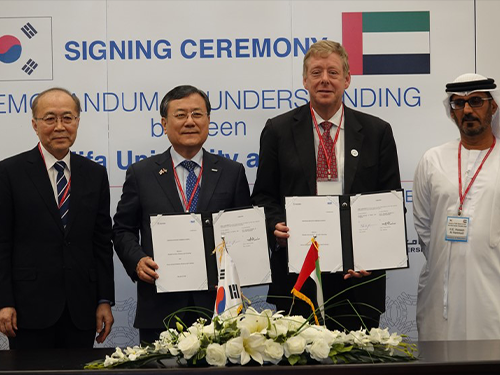 KAIST-KU Sign MOU on 4th Industrial Technology Development
(President Shin(second from left) poses with Khalifa University President Tod Laursen after signing an MOU in the UAE on March 25. Far left is Chairman of the NST Kwangyun Wohn and far right is the UAE Minister of Educatiion Hussain Al Hammadi.)
KAIST President Sung-Chul Shin and Khalifa University Interim President Tod Laursen signed an MOU on the Fourth Industrial Technology Development on March 25 in the UAE.
They signed the MOU during the UAE-ROK Nuclear Friendship and KAIST Alumni Night at Khalifa University co-hosted by KAIST and the Korea Atomic Energy Research Institute (KAERI). The MOU will bring new opportunities to further expand bilateral cooperation in education and training in the relevant technologies called for the era of the Fourth Industrial Revolution.
More than 100 dignitaries including Chairman of National Research Council of Science and Technology (NST) in Korea Dr. Kwangyun Wohn, President of KAERI Jaejoo Ha, the UAE Minister of Education His Excellency Hussain Al Hammadi, Minister of State for Advanced Sciences Her Excellency Sarah bint Yousef Al Amiri, and His Excellency Federal Authority for Nuclear Regulation (FANR) Director General Christopher Viktorsson attended the event. In particular, a significant number of Emirati graduates of the KUSTAR-KAIST education program and many others who completed various KAIST training programs joined the event.
The Nuclear Friendship Night was celebrating the completion of the first nuclear power plant in Barakah exported by Korea. This is the first nuclear reactor in the Middle East, which is to start operation later this year. The event also coincided with Korean President Moon Jae-In’s state visit to the UAE.
KAIST and KAERI gathered distinguished leaders from the higher education and nuclear industries at the event in response to the UAE government’s top national agenda of fostering future talents and promoting the nuclear industry in order to ensure energy security.
KAIST and Khalifa University signed an initial agreement in education and research in 2009 when the governments of Korea and the UAE signed a contract to build four nuclear power plants in Barakah. Since then, the two universities have worked together closely in the areas of nuclear engineering, bio-medical engineering, robotics, mechanical engineering, chemical engineering, and materials science. With this signing on the new MOU, the partnership between the two institutions will mark the second phase of educating high-caliber human resources in science and technology of the two countries.
The KAIST Alumni Night also brought more opportunities to appreciate the achievements that the two countries have made through collaboration in education and research, mostly represented in the field of nuclear technology between KAIST and Khalifa University. During the event, KAIST graduates also shared their experiences from the education at KAIST, followed by the welcoming speeches from the UAE Minister of Education and the UAE Minister of State for Advanced Sciences.
KAIST President Shin, in his welcoming speech at the event, said, “I look forward to more students in the UAE having the opportunity to experience the world’s top-level education and global environment that KAIST offers. The collaboration with Khalifa University and the UAE is very important for building both countries’ future growth.”
KU President Laursen said, “This MOU on research cooperation focusing on technologies for the Fourth Industrial Revolution, nuclear engineering, and other technical areas will further consolidate our partnership with KAIST and support us in developing human capital suitable to take on future challenges in the science and technology sectors. We firmly believe the talent pool of experts created by this initiative will contribute to the overall economic growth of the UAE.”
2018.03.26 View 12503
KAIST-KU Sign MOU on 4th Industrial Technology Development
(President Shin(second from left) poses with Khalifa University President Tod Laursen after signing an MOU in the UAE on March 25. Far left is Chairman of the NST Kwangyun Wohn and far right is the UAE Minister of Educatiion Hussain Al Hammadi.)
KAIST President Sung-Chul Shin and Khalifa University Interim President Tod Laursen signed an MOU on the Fourth Industrial Technology Development on March 25 in the UAE.
They signed the MOU during the UAE-ROK Nuclear Friendship and KAIST Alumni Night at Khalifa University co-hosted by KAIST and the Korea Atomic Energy Research Institute (KAERI). The MOU will bring new opportunities to further expand bilateral cooperation in education and training in the relevant technologies called for the era of the Fourth Industrial Revolution.
More than 100 dignitaries including Chairman of National Research Council of Science and Technology (NST) in Korea Dr. Kwangyun Wohn, President of KAERI Jaejoo Ha, the UAE Minister of Education His Excellency Hussain Al Hammadi, Minister of State for Advanced Sciences Her Excellency Sarah bint Yousef Al Amiri, and His Excellency Federal Authority for Nuclear Regulation (FANR) Director General Christopher Viktorsson attended the event. In particular, a significant number of Emirati graduates of the KUSTAR-KAIST education program and many others who completed various KAIST training programs joined the event.
The Nuclear Friendship Night was celebrating the completion of the first nuclear power plant in Barakah exported by Korea. This is the first nuclear reactor in the Middle East, which is to start operation later this year. The event also coincided with Korean President Moon Jae-In’s state visit to the UAE.
KAIST and KAERI gathered distinguished leaders from the higher education and nuclear industries at the event in response to the UAE government’s top national agenda of fostering future talents and promoting the nuclear industry in order to ensure energy security.
KAIST and Khalifa University signed an initial agreement in education and research in 2009 when the governments of Korea and the UAE signed a contract to build four nuclear power plants in Barakah. Since then, the two universities have worked together closely in the areas of nuclear engineering, bio-medical engineering, robotics, mechanical engineering, chemical engineering, and materials science. With this signing on the new MOU, the partnership between the two institutions will mark the second phase of educating high-caliber human resources in science and technology of the two countries.
The KAIST Alumni Night also brought more opportunities to appreciate the achievements that the two countries have made through collaboration in education and research, mostly represented in the field of nuclear technology between KAIST and Khalifa University. During the event, KAIST graduates also shared their experiences from the education at KAIST, followed by the welcoming speeches from the UAE Minister of Education and the UAE Minister of State for Advanced Sciences.
KAIST President Shin, in his welcoming speech at the event, said, “I look forward to more students in the UAE having the opportunity to experience the world’s top-level education and global environment that KAIST offers. The collaboration with Khalifa University and the UAE is very important for building both countries’ future growth.”
KU President Laursen said, “This MOU on research cooperation focusing on technologies for the Fourth Industrial Revolution, nuclear engineering, and other technical areas will further consolidate our partnership with KAIST and support us in developing human capital suitable to take on future challenges in the science and technology sectors. We firmly believe the talent pool of experts created by this initiative will contribute to the overall economic growth of the UAE.”
2018.03.26 View 12503 -
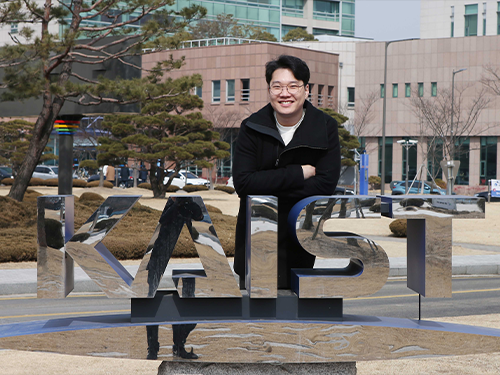 Soul-Searching & Odds-Defying Determination: A Commencement Story of Dr. Tae-Hyun Oh
(Dr. Tae-Hyun Oh, one of the 2736 graduates of the 2018)
Each and every one of the 2,736 graduates has come a long way to the 2018 Commencement. Tae-Hyun Oh, who just started his new research career at MIT after completing his Ph.D. at KAIST, is no exception.
Unlike the most KAIST freshmen straight out of the ingenious science academies of Korea, he is among the many who endured very challenging and turbulent adolescent years. Buffeted by family instability and struggling during his time at school, he saw himself trapped by seemingly impenetrable barriers. His mother, who hated to see his struggling, advised him to take a break to reflect on who he is and what he wanted to do.
After dropping out of high school in his first year, ways to make money and support his family occupied his thoughts. He took on odd jobs from a car body shop to a gas station, but the real world was very tough and sometimes even cruel to the high school dropout.
Bias and prejudice stigmatizing dropouts hurt him so much. He often overheard a parent who dropped by the body shop that he worked in saying, “If you do not study hard, you will end up like this guy.” Hearing such things terrified him and awoke his sense of purpose. So he decided to do something meaningful and be a better man than he was.
“I didn’t like the person I was growing up to become. I needed to find myself and get away from the place I was growing up. It was my adventure and it was the best decision I ever made,” says Oh.
After completing his high school diploma national certificate, he planned to apply to an engineering college. On his second try, he gained admission into the Department of Electrical Engineering at Kwang Woon University with a full scholarship. He was so thrilled for this opportunity and hoped he could do well at college. Signal processing and image processing became the interest of his research and he finished his undergraduate degree summa cum laude.
Gaining confidence in his studies, he searched around graduate school department websites in Korea to select the path he was interested in. Among others, the Robotics and Computer Vision Lab of Professor In-So Kweon at the Department of Electrical Engineering at KAIST was attractive to him.
Professor Kweon’s lab is globally renowned for robot vision technology. Their technologies were applied into HUBO, the KAIST-developed bimodal humanoid robot that won the 2015 DARPA Challenges.
“I am so appreciate of Professor Kweon, who accepted and guided me,” he said. Under Professor Kweon’s advising, he could finish his Master’s and Ph.D. courses in seven years. The mathematical modeling on fundamental computer algorithms became his main research topic.
While at KAIST, his academic research has blossomed. He won a total of 13 research prizes sponsored by corporations at home and abroad such as Kolon, Samsung, Hyundai Motors, and Qualcomm.
In 2015, he won the Microsoft Research Asia Fellowship as the sole Korean among 13 Ph.D. candidates in the Asian region. With the MSRA fellowship, he could intern at the MS Research Beijing Office for half a year and then in Redmond, Washington in the US.
“Professor Kweon’s lab filled me up with knowledge. Whenever I presented our team’s paper at an international conference, I was amazed by the strong interest shown by foreign experts, researchers, and professors. Their strong support and interest encouraged me a lot. I was fully charged with the belief that I could go abroad and explore more opportunities,” he said.
Dr. Oh, who completed his dissertation last fall, now works at the Department of Electrical Engineering and Computer Science at MIT under Professor Wojciech Matusik.
“I think the research environment at KAIST is on par with MIT. I have very rich resources for my studies and research at both schools, but at MIT the working culture is a little different and it remains a big challenge for me. I am still not familiar with collaborative work with colleagues from very diverse backgrounds and countries, and to persuade them and communicate with them is very tough. But I think I am getting better and better,” he said.
Oh, who is an avid computer game player as well, said life seems to be a game. The level of the game will be upgraded to the next level after something is accomplished. He feels great joy when he is moving up and he believes such diverse experiences have helped him become a better person day by day. Once he identified what gave him a strong sense of purpose, he wasn’t stressed out by his studies any more. He was so excited to be able to follow his passion and is ready for the next challenge.
2018.02.23 View 13598
Soul-Searching & Odds-Defying Determination: A Commencement Story of Dr. Tae-Hyun Oh
(Dr. Tae-Hyun Oh, one of the 2736 graduates of the 2018)
Each and every one of the 2,736 graduates has come a long way to the 2018 Commencement. Tae-Hyun Oh, who just started his new research career at MIT after completing his Ph.D. at KAIST, is no exception.
Unlike the most KAIST freshmen straight out of the ingenious science academies of Korea, he is among the many who endured very challenging and turbulent adolescent years. Buffeted by family instability and struggling during his time at school, he saw himself trapped by seemingly impenetrable barriers. His mother, who hated to see his struggling, advised him to take a break to reflect on who he is and what he wanted to do.
After dropping out of high school in his first year, ways to make money and support his family occupied his thoughts. He took on odd jobs from a car body shop to a gas station, but the real world was very tough and sometimes even cruel to the high school dropout.
Bias and prejudice stigmatizing dropouts hurt him so much. He often overheard a parent who dropped by the body shop that he worked in saying, “If you do not study hard, you will end up like this guy.” Hearing such things terrified him and awoke his sense of purpose. So he decided to do something meaningful and be a better man than he was.
“I didn’t like the person I was growing up to become. I needed to find myself and get away from the place I was growing up. It was my adventure and it was the best decision I ever made,” says Oh.
After completing his high school diploma national certificate, he planned to apply to an engineering college. On his second try, he gained admission into the Department of Electrical Engineering at Kwang Woon University with a full scholarship. He was so thrilled for this opportunity and hoped he could do well at college. Signal processing and image processing became the interest of his research and he finished his undergraduate degree summa cum laude.
Gaining confidence in his studies, he searched around graduate school department websites in Korea to select the path he was interested in. Among others, the Robotics and Computer Vision Lab of Professor In-So Kweon at the Department of Electrical Engineering at KAIST was attractive to him.
Professor Kweon’s lab is globally renowned for robot vision technology. Their technologies were applied into HUBO, the KAIST-developed bimodal humanoid robot that won the 2015 DARPA Challenges.
“I am so appreciate of Professor Kweon, who accepted and guided me,” he said. Under Professor Kweon’s advising, he could finish his Master’s and Ph.D. courses in seven years. The mathematical modeling on fundamental computer algorithms became his main research topic.
While at KAIST, his academic research has blossomed. He won a total of 13 research prizes sponsored by corporations at home and abroad such as Kolon, Samsung, Hyundai Motors, and Qualcomm.
In 2015, he won the Microsoft Research Asia Fellowship as the sole Korean among 13 Ph.D. candidates in the Asian region. With the MSRA fellowship, he could intern at the MS Research Beijing Office for half a year and then in Redmond, Washington in the US.
“Professor Kweon’s lab filled me up with knowledge. Whenever I presented our team’s paper at an international conference, I was amazed by the strong interest shown by foreign experts, researchers, and professors. Their strong support and interest encouraged me a lot. I was fully charged with the belief that I could go abroad and explore more opportunities,” he said.
Dr. Oh, who completed his dissertation last fall, now works at the Department of Electrical Engineering and Computer Science at MIT under Professor Wojciech Matusik.
“I think the research environment at KAIST is on par with MIT. I have very rich resources for my studies and research at both schools, but at MIT the working culture is a little different and it remains a big challenge for me. I am still not familiar with collaborative work with colleagues from very diverse backgrounds and countries, and to persuade them and communicate with them is very tough. But I think I am getting better and better,” he said.
Oh, who is an avid computer game player as well, said life seems to be a game. The level of the game will be upgraded to the next level after something is accomplished. He feels great joy when he is moving up and he believes such diverse experiences have helped him become a better person day by day. Once he identified what gave him a strong sense of purpose, he wasn’t stressed out by his studies any more. He was so excited to be able to follow his passion and is ready for the next challenge.
2018.02.23 View 13598 -
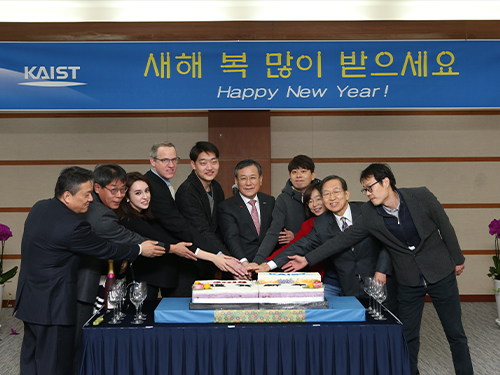 President Shin Reaffirms Innovation Initiatives in New Year Speech
(President Shin and representatives of faculty, students, staff celebrate the New Year in a reception held on January 2 at the auditorium.)
The KAIST community gathered to celebrate a fresh start for the year 2018. At the ceremony, held in the auditorium on January 2, members of KAIST community reaffirmed their commitment to be the trailblazers of Korea and beyond through unwavering innovations.
President Sung-Chul Shin presented his new vision and plan in his New Year speech, which focused on innovation for enhancing institutional competitiveness and global visibility. He said that as you are the future of KAIST, KAIST is the future of Korea. KAIST’s vision for a better future will have a significant impact on national progress and beyond. He stressed that innovation in the five pillars of education, research, technology commercialization, globalization, and future strategy will further advance the excellence of KAIST.
At the ceremony, President Shin also presented the award for ‘the KAISTian of the Year’ to Professor YongKeun Park of the Department of Physics. The annual award recognizes a distinguished professor whose academic accomplishments made the most significant impact.
In his New Year speech, President Shin said that the year 2018 will provide an opportunity to take a leap forward for becoming a ‘Global Value Creative, World-Leading University. The Vision 2031 Committee endorsed the five innovation initiatives to fulfill KAIST’s long-term vision and will open its recommendations to the public on March 20.
Educational innovation tops the initiatives. President Shin explained that the future of Korea is in the hands of talented individuals in science and technology, emphasizing the need to nurture creative, transdisciplinary talents with the capacity to enhance the social value of science and technology.
To this end, KAIST will establish a new undergraduate non-departmental program for transdisciplinary education. This plan will eventually provide students with more options in choosing their major, as well as help students build a strong foundation in basic science and engineering and encourage multidisciplinary approaches.
For creating an innovative institutional research infrastructure, KAIST plans to build a Network of Excellence for the Fourth Industrial Revolution (NExFire) for convergence research. The plan of ‘Cross-Generational Collaborative Labs,’ will bring out a new collaboration platform by pairing up senior and junior faculty. President Shin said it will be a stepping stone to extend the spectrum of knowledge without any cessation.
For technology commercialization, KAIST will maximize its intellectual property and economic value by stimulating technology-invested companies and startups. Close cooperation with venture capitalists at home and abroad will further accelerate the commercialization drive at KAIST.
Saying that the globalization is no long an option but a necessity, he stressed KAIST will strengthen its efforts to established a bilingual campus. “KAIST will make every effort to create a more welcoming and comfortable atmosphere for the international community and their families. We will expand benefits to our international community, such as access to the KAIST Child Care Center and collaboration with the Taejon Christian International School (TCIS),” he said. President Shin added he will further expand global networks and partnerships this year, participating in a diverse range of international events at home and abroad for increasing global visibility.
He also said that well-designed future strategies will complete innovation initiatives. The Future Strategy Research Center will serve as a think tank for identifying future agendas, establishing strategies and advocating for them.
In addition to the five innovation initiatives, President Shin emphasized a new organizational culture that embraces inclusiveness and mutual respect among all of the members of KAIST.
“So far, the ideal qualifications expected of KAISTians have included creativity and a challenging spirit. From now on, we will nurture talents with a focus on the 3Cs: Creativity, Challenge, and Caring. I would like to make a campus in which all members care for each other to help attain mutual growth with warmth and respect," he said.
For the full text, Click
2018.01.02 View 11682
President Shin Reaffirms Innovation Initiatives in New Year Speech
(President Shin and representatives of faculty, students, staff celebrate the New Year in a reception held on January 2 at the auditorium.)
The KAIST community gathered to celebrate a fresh start for the year 2018. At the ceremony, held in the auditorium on January 2, members of KAIST community reaffirmed their commitment to be the trailblazers of Korea and beyond through unwavering innovations.
President Sung-Chul Shin presented his new vision and plan in his New Year speech, which focused on innovation for enhancing institutional competitiveness and global visibility. He said that as you are the future of KAIST, KAIST is the future of Korea. KAIST’s vision for a better future will have a significant impact on national progress and beyond. He stressed that innovation in the five pillars of education, research, technology commercialization, globalization, and future strategy will further advance the excellence of KAIST.
At the ceremony, President Shin also presented the award for ‘the KAISTian of the Year’ to Professor YongKeun Park of the Department of Physics. The annual award recognizes a distinguished professor whose academic accomplishments made the most significant impact.
In his New Year speech, President Shin said that the year 2018 will provide an opportunity to take a leap forward for becoming a ‘Global Value Creative, World-Leading University. The Vision 2031 Committee endorsed the five innovation initiatives to fulfill KAIST’s long-term vision and will open its recommendations to the public on March 20.
Educational innovation tops the initiatives. President Shin explained that the future of Korea is in the hands of talented individuals in science and technology, emphasizing the need to nurture creative, transdisciplinary talents with the capacity to enhance the social value of science and technology.
To this end, KAIST will establish a new undergraduate non-departmental program for transdisciplinary education. This plan will eventually provide students with more options in choosing their major, as well as help students build a strong foundation in basic science and engineering and encourage multidisciplinary approaches.
For creating an innovative institutional research infrastructure, KAIST plans to build a Network of Excellence for the Fourth Industrial Revolution (NExFire) for convergence research. The plan of ‘Cross-Generational Collaborative Labs,’ will bring out a new collaboration platform by pairing up senior and junior faculty. President Shin said it will be a stepping stone to extend the spectrum of knowledge without any cessation.
For technology commercialization, KAIST will maximize its intellectual property and economic value by stimulating technology-invested companies and startups. Close cooperation with venture capitalists at home and abroad will further accelerate the commercialization drive at KAIST.
Saying that the globalization is no long an option but a necessity, he stressed KAIST will strengthen its efforts to established a bilingual campus. “KAIST will make every effort to create a more welcoming and comfortable atmosphere for the international community and their families. We will expand benefits to our international community, such as access to the KAIST Child Care Center and collaboration with the Taejon Christian International School (TCIS),” he said. President Shin added he will further expand global networks and partnerships this year, participating in a diverse range of international events at home and abroad for increasing global visibility.
He also said that well-designed future strategies will complete innovation initiatives. The Future Strategy Research Center will serve as a think tank for identifying future agendas, establishing strategies and advocating for them.
In addition to the five innovation initiatives, President Shin emphasized a new organizational culture that embraces inclusiveness and mutual respect among all of the members of KAIST.
“So far, the ideal qualifications expected of KAISTians have included creativity and a challenging spirit. From now on, we will nurture talents with a focus on the 3Cs: Creativity, Challenge, and Caring. I would like to make a campus in which all members care for each other to help attain mutual growth with warmth and respect," he said.
For the full text, Click
2018.01.02 View 11682 -
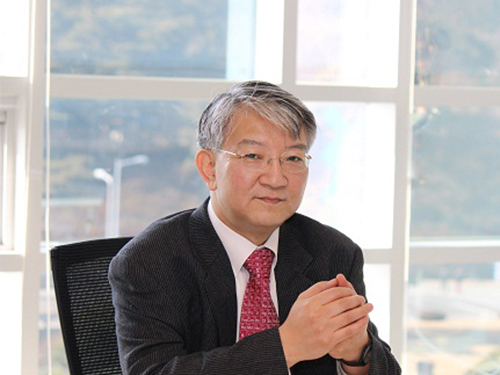 Distinguished Professor Sang Yup Lee Named NAI Fellow
(Distinguished Professor Sang Yup Lee)
Distinguished Professor Sang Yup Lee of the Department of Chemical and Biomolecular Engineering was named to the National Academy of Inventors in the US. He is the first Korean scholar ever elected as a NAI fellow.
The NAI is a non-profit member organization with over 4,000 individual inventors and fellows spanning more than 250 institutions worldwide. It is comprised of universities as well as governmental and non-profit research institutes. The academy was founded in 2010 to recognize and encourage inventors with patents from the US Patent and Trademark Office. So far, 575 fellows from 229 institutions have been elected.
The academy said Professor Lee has been recognized for fellowship induction as he has demonstrated a highly prolific spirit of innovation in creating or facilitating outstanding inventions that have made a tangible impact on quality of life, economic development, and the welfare of society.
Distinguished Professor Lee, a pioneering researcher and scholar in the field of systems metabolic engineering, was ranked in the top 1% of highly cited researchers (HCR) this year. Over the past 11 years, he published more than 130,000 articles in prestigious journals around the world. He has been cited more than 34,000 times since he started working at KAIST in 1994.
He is also the first Korean ever elected to both the National Academy of Sciences (NAS) and the National Academy of Engineering (NAE) in the US, becoming the one of 13 foreign scholars in the world holding two prestigious institutions’ fellowships.
Dr. Lee is currently the dean of KAIST Institutes, the world-leading institute for multi and interdisciplinary research. He is also serving as co-chair of the Global Council on Biotechnology and is a member of the Global Future Council on the Fourth Industrial Revolution at the World Economic Forum.
2017.12.13 View 10917
Distinguished Professor Sang Yup Lee Named NAI Fellow
(Distinguished Professor Sang Yup Lee)
Distinguished Professor Sang Yup Lee of the Department of Chemical and Biomolecular Engineering was named to the National Academy of Inventors in the US. He is the first Korean scholar ever elected as a NAI fellow.
The NAI is a non-profit member organization with over 4,000 individual inventors and fellows spanning more than 250 institutions worldwide. It is comprised of universities as well as governmental and non-profit research institutes. The academy was founded in 2010 to recognize and encourage inventors with patents from the US Patent and Trademark Office. So far, 575 fellows from 229 institutions have been elected.
The academy said Professor Lee has been recognized for fellowship induction as he has demonstrated a highly prolific spirit of innovation in creating or facilitating outstanding inventions that have made a tangible impact on quality of life, economic development, and the welfare of society.
Distinguished Professor Lee, a pioneering researcher and scholar in the field of systems metabolic engineering, was ranked in the top 1% of highly cited researchers (HCR) this year. Over the past 11 years, he published more than 130,000 articles in prestigious journals around the world. He has been cited more than 34,000 times since he started working at KAIST in 1994.
He is also the first Korean ever elected to both the National Academy of Sciences (NAS) and the National Academy of Engineering (NAE) in the US, becoming the one of 13 foreign scholars in the world holding two prestigious institutions’ fellowships.
Dr. Lee is currently the dean of KAIST Institutes, the world-leading institute for multi and interdisciplinary research. He is also serving as co-chair of the Global Council on Biotechnology and is a member of the Global Future Council on the Fourth Industrial Revolution at the World Economic Forum.
2017.12.13 View 10917 -
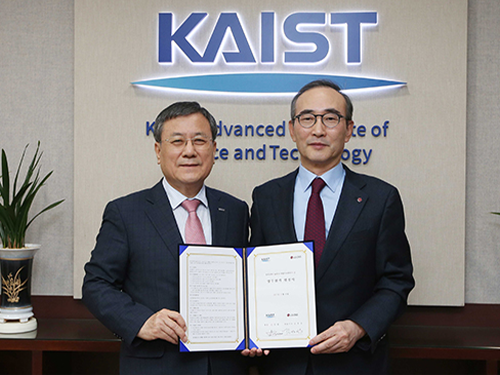 Strengthening Industry-Academia Cooperation with LG CNS
On November 20, KAIST signed an MoU with LG CNS for industry-academia partnership in education, research, and business in the fields of AI and Big Data. Rather than simply developing education programs or supporting industry-academia scholarships, both organizations agreed to carry out a joint research project on AI and Big Data that can be applied to practical business.
KAIST will collaborate with LG CNS in the fields of smart factories, customer analysis, and supply chain management analysis.
Not only will LG CNS offer internships to KAIST students, but it also will support professors and students who propose innovative startup ideas for AI and Big Data. Offering an industry-academia scholarship for graduate students is also being discussed. Together with LG CNS, KAIST will put its efforts into propose projects regarding AI and Big Data in the public sector.
Furthermore, KAIST and LG CNS will jointly explore and carry out industry-academia projects that could be practically used in business. Both will carry out the project vigorously through strong cooperation; for instance, LG CNS employees can be assigned to KAIST, if necessary. Also, LG CNS’s AI and Big Data platform, called DAP (Data Analytics & AI Platform) will be used as a data analysis tool during the project and the joint outcomes will be installed in DAP.
KAIST professors with expertise in AI deep learning have trained LG CNS employees since the Department of Industrial & Systems Engineering established ‘KAIST AI Academy’ in LG CNS last August.
“With KAIST, the best research-centered university in Korea, we will continue to lead in developing the field of AI and Big Data and provide innovative services that create value by connecting them to customer business,” Yong Shub Kim, the CEO of LG CNS, highlighted.
2017.11.22 View 14500
Strengthening Industry-Academia Cooperation with LG CNS
On November 20, KAIST signed an MoU with LG CNS for industry-academia partnership in education, research, and business in the fields of AI and Big Data. Rather than simply developing education programs or supporting industry-academia scholarships, both organizations agreed to carry out a joint research project on AI and Big Data that can be applied to practical business.
KAIST will collaborate with LG CNS in the fields of smart factories, customer analysis, and supply chain management analysis.
Not only will LG CNS offer internships to KAIST students, but it also will support professors and students who propose innovative startup ideas for AI and Big Data. Offering an industry-academia scholarship for graduate students is also being discussed. Together with LG CNS, KAIST will put its efforts into propose projects regarding AI and Big Data in the public sector.
Furthermore, KAIST and LG CNS will jointly explore and carry out industry-academia projects that could be practically used in business. Both will carry out the project vigorously through strong cooperation; for instance, LG CNS employees can be assigned to KAIST, if necessary. Also, LG CNS’s AI and Big Data platform, called DAP (Data Analytics & AI Platform) will be used as a data analysis tool during the project and the joint outcomes will be installed in DAP.
KAIST professors with expertise in AI deep learning have trained LG CNS employees since the Department of Industrial & Systems Engineering established ‘KAIST AI Academy’ in LG CNS last August.
“With KAIST, the best research-centered university in Korea, we will continue to lead in developing the field of AI and Big Data and provide innovative services that create value by connecting them to customer business,” Yong Shub Kim, the CEO of LG CNS, highlighted.
2017.11.22 View 14500 -
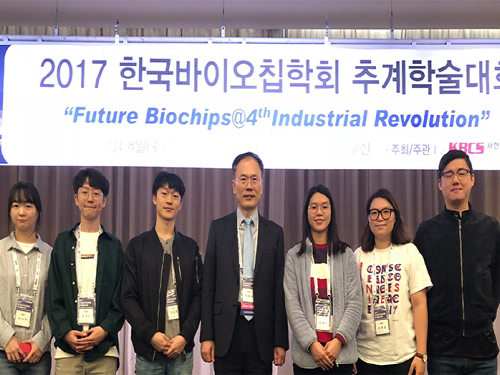 Professor Je-Kyun Park, Awarded by The Korean BioChip Society
On November 9, Je-Kyun Park from the Department of Bio and Brain Engineering at KAIST received an award from the 2017 Fall Meeting of The Korean BioChip Society held in Paradise Hotel Busan, Korea. This year’s meeting recognized Professor Park for developing lab-on-a-chip and microfluidic analytical technologies.
The Korean BioChip Society is a corporation of biochip professional established in 2006 for the development of biochip technology. Every year, the Society selects a recipient based on the nominees’ academic achievements and contributions to bio-fusion industry.
Professor Park served on the international editorial boards of renowned international journals in related fields, including Biosensors and Bioelectronics and Lab on a Chip. He was also the Committee Chairman of MicroTas in 2015.
2017.11.22 View 10610
Professor Je-Kyun Park, Awarded by The Korean BioChip Society
On November 9, Je-Kyun Park from the Department of Bio and Brain Engineering at KAIST received an award from the 2017 Fall Meeting of The Korean BioChip Society held in Paradise Hotel Busan, Korea. This year’s meeting recognized Professor Park for developing lab-on-a-chip and microfluidic analytical technologies.
The Korean BioChip Society is a corporation of biochip professional established in 2006 for the development of biochip technology. Every year, the Society selects a recipient based on the nominees’ academic achievements and contributions to bio-fusion industry.
Professor Park served on the international editorial boards of renowned international journals in related fields, including Biosensors and Bioelectronics and Lab on a Chip. He was also the Committee Chairman of MicroTas in 2015.
2017.11.22 View 10610 -
 WEF-KAIST to Host a Forum Next April in Korea
(President Shin poses with Chairman Schwab at the meeting in Dubai)
President Sung-Chul Shin and Executive Chairman Klaus Schwab of the World Economic Forum agreed to co-host the Fourth Industrial Revolution Forum next April in Seoul during a meeting at the WEF Global Future Councils 2017 held in Dubai November 11-12.
Next April’s forum will be a follow-up event of the roundtable discussion KAIST and the WEF Center for the Fourth Industrial Revolution co-hosted in October in Seoul. The two hosted the roundtable discussion titled “Mastering the Fourth Industrial Revolution: The Future of Jobs and Inclusive Growth in Korea.”
During the annual meeting in Dubai, Chairman Schwab expressed his deep appreciation to President Shin for hosting the roundtable discussion and proposed a full-fledged forum in partnership with KAIST once again, which Chairman Schwab will be scheduled to attend.
Chairman Schwab emphasized once again that Korea, who has the world’s top high-end technologies such as 5G telecommunications and semiconductor memory, will be the best fit to realize the Fourth Industrial Revolution most rapidly. He also expressed his great interest in the city of Daejeon in which is being considered to become the Special City for the Fourth Industrial Revolution.
The Global Future Council of the WEF is the interdisciplinary knowledge network dedicated to promoting innovative thinking on the future. The annual council convenes in Dubai the most relevant and knowledgeable thought leaders from academia, government, business, and civil society to challenge conventional thinking and develop new insights and perspectives on key global systems, as well as the impact and governance of key emerging technologies. This year, more than 850 world-leading experts from 74 countries participated.
Under the theme of ‘Vision 2030,’ participants explored systematic changes in key areas such as energy, mobility, and infrastructure while reflecting on the impact of technological breakthroughs in artificial intelligence, biotechnology, and other areas related to the Fourth Industrial Revolution.
2017.11.13 View 11358
WEF-KAIST to Host a Forum Next April in Korea
(President Shin poses with Chairman Schwab at the meeting in Dubai)
President Sung-Chul Shin and Executive Chairman Klaus Schwab of the World Economic Forum agreed to co-host the Fourth Industrial Revolution Forum next April in Seoul during a meeting at the WEF Global Future Councils 2017 held in Dubai November 11-12.
Next April’s forum will be a follow-up event of the roundtable discussion KAIST and the WEF Center for the Fourth Industrial Revolution co-hosted in October in Seoul. The two hosted the roundtable discussion titled “Mastering the Fourth Industrial Revolution: The Future of Jobs and Inclusive Growth in Korea.”
During the annual meeting in Dubai, Chairman Schwab expressed his deep appreciation to President Shin for hosting the roundtable discussion and proposed a full-fledged forum in partnership with KAIST once again, which Chairman Schwab will be scheduled to attend.
Chairman Schwab emphasized once again that Korea, who has the world’s top high-end technologies such as 5G telecommunications and semiconductor memory, will be the best fit to realize the Fourth Industrial Revolution most rapidly. He also expressed his great interest in the city of Daejeon in which is being considered to become the Special City for the Fourth Industrial Revolution.
The Global Future Council of the WEF is the interdisciplinary knowledge network dedicated to promoting innovative thinking on the future. The annual council convenes in Dubai the most relevant and knowledgeable thought leaders from academia, government, business, and civil society to challenge conventional thinking and develop new insights and perspectives on key global systems, as well as the impact and governance of key emerging technologies. This year, more than 850 world-leading experts from 74 countries participated.
Under the theme of ‘Vision 2030,’ participants explored systematic changes in key areas such as energy, mobility, and infrastructure while reflecting on the impact of technological breakthroughs in artificial intelligence, biotechnology, and other areas related to the Fourth Industrial Revolution.
2017.11.13 View 11358 -
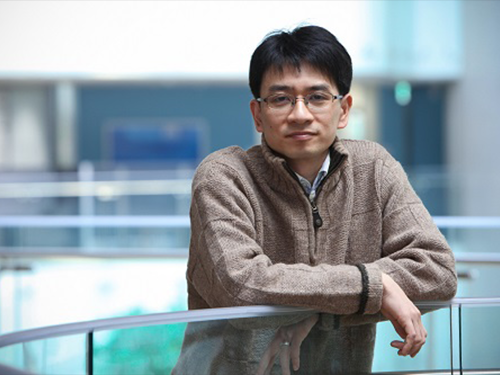 Professor Lee's Research Selected as Top 100 National R&D Projects
A research project, led by Research Professor Ju Yong Lee from the KAIST Institute for IT Convergence, was selected as one of the Top 100 National Research and Development Projects 2017.
This research project, titled LTE-A-based Single RF Small Base Station supporting Multiple Streams, developed 300Mbps low power, low complexity and broadband small base station technology that supports 4x4 MIMO (Multiple Input and Multiple Output) by proposing a new antenna structure and a new RF (Radio Frequency) structure based on LTE-A. Professors from the School of Electrical Engineering at KAIST, Dong Ho Cho, Songcheol Hong, and Yong Hoon Lee also collaborated on the project.
The existing heterodyne method of communication systems generates the problems of increasing unit price and system complexity.
In this project, however, Professor Lee directly modulated the baseband signal from the RF stage through an impedance loading-based RF chip. This method was designed to facilitate low power as well as low complexity while supporting broadband service. Based on this, his team developed source technology for RF that can be applied to fourth and even fifth generation networks.
Furthermore, this base station is smallest among the small-cell stations so far, providing an eco-friendly installation environment. It contributes to the market for fifth generation mobile communications by reducing power consumption significantly yet providing high-capacity services.
Professor Lee said, “This technology will contribute to creating a new market and additional jobs because business based on the fifth mobile generation can provide multi-functional services, including multiband. Requiring low power and providing high-capacity services anywhere at any time will enhance national competence and reduce costs for establishing a next generation mobile communication system. It is expected that this technology will help with disseminating mobile communication infrastructure through expanding information and communication system as well as the infrastructure of island areas.”
2017.11.08 View 11356
Professor Lee's Research Selected as Top 100 National R&D Projects
A research project, led by Research Professor Ju Yong Lee from the KAIST Institute for IT Convergence, was selected as one of the Top 100 National Research and Development Projects 2017.
This research project, titled LTE-A-based Single RF Small Base Station supporting Multiple Streams, developed 300Mbps low power, low complexity and broadband small base station technology that supports 4x4 MIMO (Multiple Input and Multiple Output) by proposing a new antenna structure and a new RF (Radio Frequency) structure based on LTE-A. Professors from the School of Electrical Engineering at KAIST, Dong Ho Cho, Songcheol Hong, and Yong Hoon Lee also collaborated on the project.
The existing heterodyne method of communication systems generates the problems of increasing unit price and system complexity.
In this project, however, Professor Lee directly modulated the baseband signal from the RF stage through an impedance loading-based RF chip. This method was designed to facilitate low power as well as low complexity while supporting broadband service. Based on this, his team developed source technology for RF that can be applied to fourth and even fifth generation networks.
Furthermore, this base station is smallest among the small-cell stations so far, providing an eco-friendly installation environment. It contributes to the market for fifth generation mobile communications by reducing power consumption significantly yet providing high-capacity services.
Professor Lee said, “This technology will contribute to creating a new market and additional jobs because business based on the fifth mobile generation can provide multi-functional services, including multiband. Requiring low power and providing high-capacity services anywhere at any time will enhance national competence and reduce costs for establishing a next generation mobile communication system. It is expected that this technology will help with disseminating mobile communication infrastructure through expanding information and communication system as well as the infrastructure of island areas.”
2017.11.08 View 11356 -
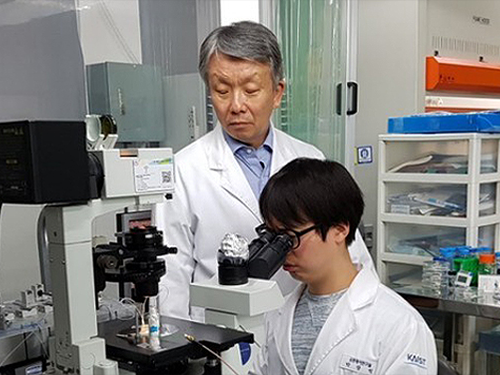 Scientist of November, Professor Hyung Jin Sung
Professor Hyung Jin Sung from the Department of Mechanical Engineering at KAIST received a ‘Science and Technology Award of the Month’ given by the Ministry of ICT and Science and the National Research Foundation of Korea for November 2017. He developed technology that can exquisitely control a micrometer-scaled liquid drop on a dime-sized lab-on-a-chip. With his work, he was recognized for reinforcing research capability on microfluidics.
Lab-on-a-chip is an emerging experiment and diagnostic technology in the form of a bio-microchip that facilitates complex and various experiments with only a minimal sample size required. This technology draws a lot of attention not only from medical and pharmaceutical areas, but also the health and environmental field. The biggest problem was that technology for the temperature control of a fluid sample, which is one of the core technologies in microfluidics, has low accuracy. This limit had to be overcome in order to use the lab-on-a-chip more widely.
Professor Sung developed an acoustic and thermal method which controls the temperature of a droplet quickly and meticulously by using sound and energy. This is a thermal method that uses heat generated during the absorption of an acoustic wave into viscoelastic substances. It facilitates a rapid heating rate and spatial-temporal temperature control, allowing heating in desired areas. In addition, Professor Sung applied his technology to polymerase chain reactions, which are used to amplify DNA.
Through this experiment, he successfully shortened the reaction time from 1-2 hours to only three minutes, making this a groundbreaking achievement.
Professor Sung said, “My research is significant for enhancing the applicability of microfluidics. I expect that it will lead to technological innovations in healthcare fields including biochemistry, medical checkups, and new medicine development.”
2017.11.03 View 12686
Scientist of November, Professor Hyung Jin Sung
Professor Hyung Jin Sung from the Department of Mechanical Engineering at KAIST received a ‘Science and Technology Award of the Month’ given by the Ministry of ICT and Science and the National Research Foundation of Korea for November 2017. He developed technology that can exquisitely control a micrometer-scaled liquid drop on a dime-sized lab-on-a-chip. With his work, he was recognized for reinforcing research capability on microfluidics.
Lab-on-a-chip is an emerging experiment and diagnostic technology in the form of a bio-microchip that facilitates complex and various experiments with only a minimal sample size required. This technology draws a lot of attention not only from medical and pharmaceutical areas, but also the health and environmental field. The biggest problem was that technology for the temperature control of a fluid sample, which is one of the core technologies in microfluidics, has low accuracy. This limit had to be overcome in order to use the lab-on-a-chip more widely.
Professor Sung developed an acoustic and thermal method which controls the temperature of a droplet quickly and meticulously by using sound and energy. This is a thermal method that uses heat generated during the absorption of an acoustic wave into viscoelastic substances. It facilitates a rapid heating rate and spatial-temporal temperature control, allowing heating in desired areas. In addition, Professor Sung applied his technology to polymerase chain reactions, which are used to amplify DNA.
Through this experiment, he successfully shortened the reaction time from 1-2 hours to only three minutes, making this a groundbreaking achievement.
Professor Sung said, “My research is significant for enhancing the applicability of microfluidics. I expect that it will lead to technological innovations in healthcare fields including biochemistry, medical checkups, and new medicine development.”
2017.11.03 View 12686 -
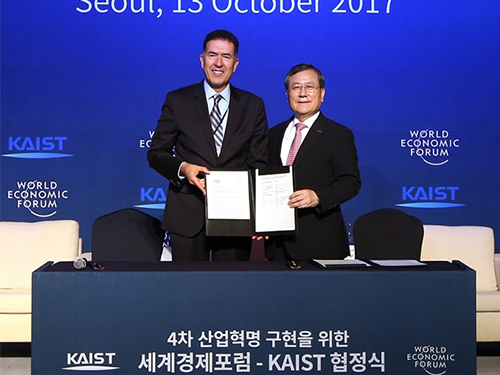 KAIST Partners with WEF to Prepare for the 4th Industrial Revolution
KAIST President Sung-Chul Shin and the Head of the World Economic Forum Center for the Fourth Industrial Revolution, Murat Sonmez, made a commitment to build cooperation in an active manner for addressing the ramifications of the Fourth Industrial Revolution.
The two signed an MOU to cooperate in research in related fields on October 13 after holding a roundtable discussion titled “The Future of Jobs and Inclusive Growth in Korea”. It is the first partnership that the WEF has sealed with an academic institution.The roundtable discussion brought together distinguished guests from politics, non-profit civic organizations, academia, and enterprises including Daejeon Mayor Seon-Taek Kwon, Doosan Group Vice Chairman Lee Hyun-Soon, and Korean Venture Business Association President Ahn Keon-Joon.
During the news conference, President Shin said, “This event means a lot because it explores ways in which inclusive growth and job creation can be realized in Korea. To move forward in the new age of the Fourth Industrial Revolution, every country needs to adopt appropriate new policies suitable for their specific market environments. KAIST will contribute to this process for Korea as well as for the global community.”
President Shin also said, “Korea has been a fast follower in previous industrial revolutions. Now, we have the momentum to seize the opportunities in the wake of this revolution. KAIST is dedicated to leading Korea into becoming a first mover in the Fourth Industrial Revolution by cooperating with the WEF.”
“Two decades later, we will live with considerable number of robots around us. It is possible that our societies in the future will consist of Homo sapiens and Robo sapiens. We need to create new jobs for Homo sapiens to prepare for a society that we will have to coexist with a new industrial tribe. Industries need continuing education to retrain workers for the ever evolving industrial landscape of the future,” President Shin emphasized.
Meanwhile, Sonmez pointed out that all stakeholders should participate in understanding the new industrial environment’s ramifications, saying “Societies, governments, public and private sectors, startups, and academia should co-design inclusive models through global efforts. Ethics and influences on the job market should also be taken into consideration.”
Sonmez said nine factors such as blockchains, internet of things, artificial intelligence, machine learning, cross-border data blow, drones, 3D printing, autonomous driving, the environment, and precision medicine will take center stage in the Fourth Industrial Revolution, In particular, he said that blockchains, which are a cybersecurity technology for online financial transactions, will bring even bigger changes than the ‘World Wide Web’ has done over the past three decades.
“To this end, we will have to work closely with major academic institutes. Through this partnership with KAIST, we will make the fruits of the new industrial environment benefit Koreans and Korean society,” Sonmez added.
2017.10.14 View 10719
KAIST Partners with WEF to Prepare for the 4th Industrial Revolution
KAIST President Sung-Chul Shin and the Head of the World Economic Forum Center for the Fourth Industrial Revolution, Murat Sonmez, made a commitment to build cooperation in an active manner for addressing the ramifications of the Fourth Industrial Revolution.
The two signed an MOU to cooperate in research in related fields on October 13 after holding a roundtable discussion titled “The Future of Jobs and Inclusive Growth in Korea”. It is the first partnership that the WEF has sealed with an academic institution.The roundtable discussion brought together distinguished guests from politics, non-profit civic organizations, academia, and enterprises including Daejeon Mayor Seon-Taek Kwon, Doosan Group Vice Chairman Lee Hyun-Soon, and Korean Venture Business Association President Ahn Keon-Joon.
During the news conference, President Shin said, “This event means a lot because it explores ways in which inclusive growth and job creation can be realized in Korea. To move forward in the new age of the Fourth Industrial Revolution, every country needs to adopt appropriate new policies suitable for their specific market environments. KAIST will contribute to this process for Korea as well as for the global community.”
President Shin also said, “Korea has been a fast follower in previous industrial revolutions. Now, we have the momentum to seize the opportunities in the wake of this revolution. KAIST is dedicated to leading Korea into becoming a first mover in the Fourth Industrial Revolution by cooperating with the WEF.”
“Two decades later, we will live with considerable number of robots around us. It is possible that our societies in the future will consist of Homo sapiens and Robo sapiens. We need to create new jobs for Homo sapiens to prepare for a society that we will have to coexist with a new industrial tribe. Industries need continuing education to retrain workers for the ever evolving industrial landscape of the future,” President Shin emphasized.
Meanwhile, Sonmez pointed out that all stakeholders should participate in understanding the new industrial environment’s ramifications, saying “Societies, governments, public and private sectors, startups, and academia should co-design inclusive models through global efforts. Ethics and influences on the job market should also be taken into consideration.”
Sonmez said nine factors such as blockchains, internet of things, artificial intelligence, machine learning, cross-border data blow, drones, 3D printing, autonomous driving, the environment, and precision medicine will take center stage in the Fourth Industrial Revolution, In particular, he said that blockchains, which are a cybersecurity technology for online financial transactions, will bring even bigger changes than the ‘World Wide Web’ has done over the past three decades.
“To this end, we will have to work closely with major academic institutes. Through this partnership with KAIST, we will make the fruits of the new industrial environment benefit Koreans and Korean society,” Sonmez added.
2017.10.14 View 10719 -
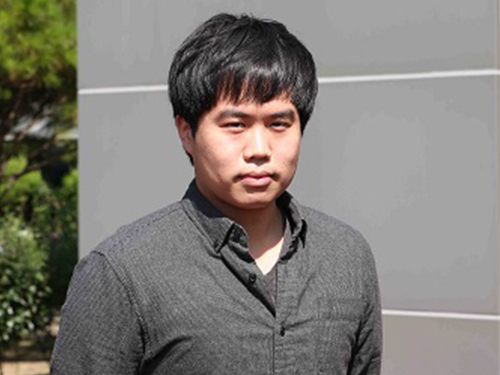 Sangeun Oh Recognized as a 2017 Google Fellow
Sangeun Oh, a Ph.D. candidate in the School of Computing was selected as a Google PhD Fellow in 2017. He is one of 47 awardees of the Google PhD Fellowship in the world.
The Google PhD Fellowship awards students showing outstanding performance in the field of computer science and related research. Since being established in 2009, the program has provided various benefits, including scholarships worth $10,000 USD and one-to-one research discussion with mentors from Google.
His research work on a mobile system that allows interactions among various kinds of smart devices was recognized in the field of mobile computing. He developed a mobile platform that allows smart devices to share diverse functions, including logins, payments, and sensors. This technology provides numerous user experiences that existing mobile platforms could not offer. Through cross-device functionality sharing, users can utilize multiple smart devices in a more convenient manner. The research was presented at The Annual International Conference on Mobile Systems, Applications, and Services (MobiSys) of the Association for Computing Machinery in July, 2017.
Oh said, “I would like to express my gratitude to my advisor, the professors in the School of Computing, and my lab colleagues. I will devote myself to carrying out more research in order to contribute to society.”
His advisor, Insik Shin, a professor in the School of Computing said, “Being recognized as a Google PhD Fellow is an honor to both the student as well as KAIST. I strongly anticipate and believe that Oh will make the next step by carrying out good quality research.”
2017.09.27 View 15269
Sangeun Oh Recognized as a 2017 Google Fellow
Sangeun Oh, a Ph.D. candidate in the School of Computing was selected as a Google PhD Fellow in 2017. He is one of 47 awardees of the Google PhD Fellowship in the world.
The Google PhD Fellowship awards students showing outstanding performance in the field of computer science and related research. Since being established in 2009, the program has provided various benefits, including scholarships worth $10,000 USD and one-to-one research discussion with mentors from Google.
His research work on a mobile system that allows interactions among various kinds of smart devices was recognized in the field of mobile computing. He developed a mobile platform that allows smart devices to share diverse functions, including logins, payments, and sensors. This technology provides numerous user experiences that existing mobile platforms could not offer. Through cross-device functionality sharing, users can utilize multiple smart devices in a more convenient manner. The research was presented at The Annual International Conference on Mobile Systems, Applications, and Services (MobiSys) of the Association for Computing Machinery in July, 2017.
Oh said, “I would like to express my gratitude to my advisor, the professors in the School of Computing, and my lab colleagues. I will devote myself to carrying out more research in order to contribute to society.”
His advisor, Insik Shin, a professor in the School of Computing said, “Being recognized as a Google PhD Fellow is an honor to both the student as well as KAIST. I strongly anticipate and believe that Oh will make the next step by carrying out good quality research.”
2017.09.27 View 15269